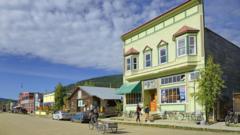In Dawson City, Yukon Territory, a significant political standoff has emerged following the refusal of newly elected town council members to pledge allegiance to King Charles III. This decision, led by mayor-elect Stephen Johnson, represents not just a personal conviction but a broader solidarity with indigenous communities, highlighting ongoing concerns regarding the Crown's historical relationship with Canada's native peoples.
The new council, elected last month, was scheduled to be sworn in earlier this month. However, they collectively declined to take the Oath of Allegiance, a requirement under Yukon law, which mandates that new officials must complete this process within 40 days of election or risk nullifying their victory. Mayor-elect Johnson has expressed how the situation has left him and the council in a challenging position, inhibiting their ability to function legally under municipal regulations.
"This is a bit of a sticky situation," he remarked, emphasizing the frustration stemming from their inability to make official decisions until this oath is taken. Johnson's refusal is particularly in support of fellow councillor Darwyn Lynn, an indigenous member of the Tr’ondëk Hwëch’in First Nation, who raised concerns over the pledge's implications for the recognition of indigenous rights and historical context.
"It was just something we wanted to do together to show solidarity in what we do here in this town," Johnson stated, clarifying that their actions were not intended as a disrespectful gesture toward the monarchy. In response to their stand, the council has reached out to Yukon provincial authorities seeking an alternative oath that may reflect their values and commitment to community governance.
The outgoing mayor, Bill Kendrick, has articulated mixed sentiments within the community regarding the council's choice, noting that opinions on the royal oath range from viewing it as outdated to perceiving it as a crucial component of Canada's governance structure. The rich historical background of Dawson City, once a heart of the Klondike Gold Rush and situated on the territory of the Tr’ondëk Hwëch’in, underlines the complexities of this ongoing discussion.
Canada's reckoning with its colonial past has intensified in recent years, particularly with Prime Minister Justin Trudeau publicly recognizing the country's fraught legacy concerning indigenous peoples. The refusal to take the oath echoes similar past incidents, such as Quebec's legislation in 2022, which removed the requirement for elected officials to pledge allegiance to the monarchy.
As Dawson City's council awaits a resolution, they embody a critical moment of reflection, advocating for a narrative of solidarity and awareness that resonates throughout indigenous communities in Canada and beyond.
The new council, elected last month, was scheduled to be sworn in earlier this month. However, they collectively declined to take the Oath of Allegiance, a requirement under Yukon law, which mandates that new officials must complete this process within 40 days of election or risk nullifying their victory. Mayor-elect Johnson has expressed how the situation has left him and the council in a challenging position, inhibiting their ability to function legally under municipal regulations.
"This is a bit of a sticky situation," he remarked, emphasizing the frustration stemming from their inability to make official decisions until this oath is taken. Johnson's refusal is particularly in support of fellow councillor Darwyn Lynn, an indigenous member of the Tr’ondëk Hwëch’in First Nation, who raised concerns over the pledge's implications for the recognition of indigenous rights and historical context.
"It was just something we wanted to do together to show solidarity in what we do here in this town," Johnson stated, clarifying that their actions were not intended as a disrespectful gesture toward the monarchy. In response to their stand, the council has reached out to Yukon provincial authorities seeking an alternative oath that may reflect their values and commitment to community governance.
The outgoing mayor, Bill Kendrick, has articulated mixed sentiments within the community regarding the council's choice, noting that opinions on the royal oath range from viewing it as outdated to perceiving it as a crucial component of Canada's governance structure. The rich historical background of Dawson City, once a heart of the Klondike Gold Rush and situated on the territory of the Tr’ondëk Hwëch’in, underlines the complexities of this ongoing discussion.
Canada's reckoning with its colonial past has intensified in recent years, particularly with Prime Minister Justin Trudeau publicly recognizing the country's fraught legacy concerning indigenous peoples. The refusal to take the oath echoes similar past incidents, such as Quebec's legislation in 2022, which removed the requirement for elected officials to pledge allegiance to the monarchy.
As Dawson City's council awaits a resolution, they embody a critical moment of reflection, advocating for a narrative of solidarity and awareness that resonates throughout indigenous communities in Canada and beyond.




















